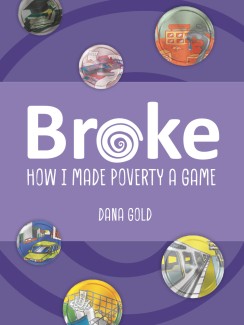Broke
POVERTY IS NOT A GAME! After growing up poor and working for decades in shelters and halfway houses, Dana Gold created a board game to help people of goodwill understand how families get ensnared in poverty and how difficult the struggle is to overcome structured inequity. The game, now called Broke, creates empathy for people who are poor by giving players the opportunity to experience the stress and frustration of making high stakes decisions with competing priorities and not enough income.
Playing Broke, now also an app, not only informs but creates the will to make system change a reality.
Purchase the board game | Purchase the mobile game (iOS, Android)

Getting people to care is similar to getting people to buy a car. You have to make them feel something. Whether making someone care about their image (I’m a BMW kinda girl) or making a statement about their concern for the environment (I drive a Prius), getting people to buy something means making them feel that the product reflects their identity and values.
But what about larger social issues like poverty? How do we get people to buy-in to system-change and care about overhauling the confounding system of poverty that fuels our political conversations and underpins the future of our economy? In order to make change, as we have learned from marketing teams, people need to feel something to buy something. Creating empathy in order to solve issues like social inequity is exceedingly difficult. How do we suspend prejudice, judgmental attitudes and hubris in order to learn from the extremely challenging situations faced by people living in poverty in the US?
Broke, a board game and an online game available through app stores, creates empathy in the people who choose to play as they draw a card, make a choice and roll the dice. By navigating the game board as farmer, single parent or someone living in a homeless shelter, players immerse themselves in the feelings evoked by making really difficult decisions with limited resources and competing priorities.
Overcoming poverty is NOT simple, even when you have the privilege of white skin, English language ability, and an education. It takes creative thinking, willingness to engage in situational ethics, and incredible tenacity. Broke plunges the player into situations they may never have dreamed of experiencing in order to help them feel the mind-numbing pressure the poor experience on a daily basis.
In Broke: How I Made Poverty a Game, Dana Gold shares her experience as non-profit leader who has run soup kitchens, shelters and halfway houses as well as her personal experience as a child and a parent who has struggled with making ends meet herself. Dana shares vividly and evocatively some of the crazy-making situations that pepper the landscape of the poor as they struggle to emerge from the poverty spiral.
Dana created the earliest version of Broke, the game, in the 1990’s. At the time, the game was called The Department of Public Assistance, and it was created with a sheet of butcher block paper and movers she swiped from her kid’s Chutes and Ladders game. Broke, as the game is called today, helps people feel what they might otherwise dismiss with pity or gloss over with politically based pronouncements. Players experience frustration, pressure and the feelings of defeat that can overcome the critical thought process necessary to strategically wage a campaign against poverty.
